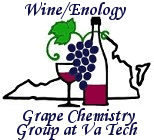 Enology Notes #61, September 23, 2002
Enology Notes #61, September 23, 2002
To: Regional Vintners
From: Bruce Zoecklein, Head, Enology-Grape Chemistry Group, Virginia Tech
Subject: Red Wine Phenolic Management; Special Topic in Grape and Wine Analysis: Tannin-Color Measurement and Management Short Course, January 16, 2003; Industry Economics
Red Wine Phenolic Management. Red winemaking consists of extraction and modification of the phenolic compounds with qualities associated with the notion of ‘good’ tannins. While the exact chemical structures of these tannins remain unknown, phenolic maturity of the grape and processing techniques are essential factors impacting quality.
For several seasons we have been evaluating the impact of fruit maturity and processing on grape glycosides, such as anthocyanins and their association with other phenolic compounds (see Enology-Grape Chemistry web site: Enology Notes # 23).
Seed tannins are important to obtain a well balanced wine. They react with anthocyanins, helping to form stable color and provide structure. However, their presence in excess produces hard, tannic products, the basis for our initial research in 1998 on Delestage (see Enology Notes # 23).
In the seeds, the extractable tannin quantity decreases during maturation. This decrease depends on seasonal and vineyard management practices. As maturity increases, the degree of polymerization of these tannins increases, as does their reactivity towards proteins. It appears that polymerization can be influenced by temperatures during the season.
Skin tannins, on the other hand, are less reactive to proteins and can give soft tannin structure to a wine. We have seen that in our climate, excessive extraction of even mature skin tannins (as occurs with extended post-fermentation maceration) produces wines which are often vegetal, flat and bitter. Minimizing excessive extraction is a primary reason why general cap management and relatively thin caps are important.
Skins rich in anthocyanins signify good maturity, which is strongly and positively correlated to mature, soft skin tannins. Conversely, for a given cultivar, skins low in color are generally a sign of poor maturity, which is associated with hard tannins. Because of these relationships, it is possible to use skin color measurements to evaluate tannin maturity. This is an active area of research. It may be possible to soon use a non-destructive, field test to measure grape color which correlates well to tannin maturity.
In addition to phenolic maturity, phenolic extraction is an important issue. Grapes that are high in phenols do not necessarily produce wines that are also rich in phenolic compounds. Extractability is an important grape quality issue. Many have followed the recommendation of waiting for a slight increase in maturity, almost to what some might call overly mature. Frequently, red wines produced from such fruit are superior, due to both increased skin tannin maturity (polymerization), extractability and engustment (the rapid increase in free aroma/flavor volatiles produced at the end of the season-see Enology Notes # 23). Grape maturation essentially represents a decay phenomenon with enzymatic hydrolysis increasing the ease by which grape constituents are released into the wine.
Tannin-Color Measurement and Management Short Course. The Enology-Grape Chemistry Group will offer a one-day Tannin and Color Measurement and Management short course, January 16, 2003. It will be conducted in the teaching laboratory of the Food Science and Technology Building at Virginia Tech.
The program will compare wet chemistry and spectrophotometric analysis of phenolic compounds, including tannins and pigments. These measurements are useful in determining color extractions, stability and browning capacity of red and white wines. Lectures on the nature of phenolic compounds and their management will supplement laboratory analyses. The program will include the following:
Registrants will participate in hands-on lab analysis. Analysis will be supplemented with a laboratory manual and discussions concerning the practical winemaking significance of each test.
Enrollment is Limited: The short course will be limited to a total of 14 participants.
Registration preference will be given to Virginia bonded winery representatives that register BEFORE MONDAY, DECEMBER 2, 2002. After that date, open enrollment will be offered if space is available. Preference will be given to those who are in commercial wine production. You will not be registered until your check is received!!!
Cost: $200 per person, due by December 2, 2002. Make checks payable to:
Bruce Zoecklein, Foundation Account, Virginia Tech.
Mail to:
Bruce Zoecklein
Head, Enology-Grape Chemistry Group
Department of Food Science & Technology
Virginia Tech - 0418
Blacksburg, VA 24061
Course fee is non-refundable.
Industry Economics. An analysis of the economic impact of Virginia’s wine industry has just been completed by Virginia Commonwealth University and the Wine Marketing Office of the Virginia Department of Agriculture and Consumer Service.
Total economic impact of wine-related tourism from out-of-state visitors is estimated at $26.5 million/year.
Production and sales are estimated to generate $45.8-$69.2 million/year.
Total economic impact of the Virginia wine industry is approximately $95.7 million.
A copy of the study will be mailed to each winery by the VA Wine Marketing Office.
Subscription to Enology Notes. All past Enology Notes and Vintner's Corner newsjournals are posted on the Enology-Grape Chemistry Group's web site at: http://www.fst.vt.edu/zoecklein/index.html or http://www.vtwines.info/. Enology Notes are slightly different in content from the subscription based Vintner's Corner newsjournal.
To be added to the Enology Notes list serve send an email message to bzoeckle@vt.edu with the word "ADD" or "REMOVE" in the subject line.
Dr. Bruce Zoecklein
Associate Professor and Enology Specialist
Head Enology-Grape Chemistry Group
Department of Food Science and Technology
Virginia Tech
Blacksburg VA 24061
Enology-Grape Chemistry Group Web address: www.vtwines.info or www.fst.vt.edu/zoecklein/index.html
Phone: (540) 231-5325
Fax: (540) 231-9293
Email: bzoeckle@vt.edu